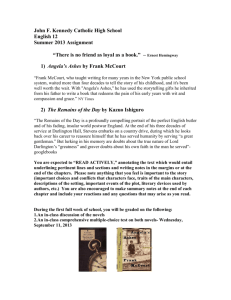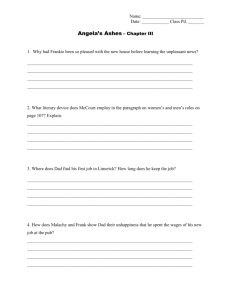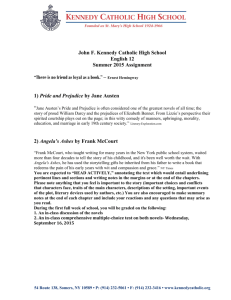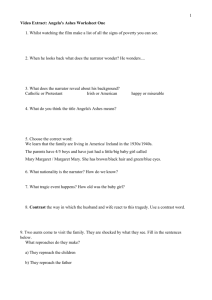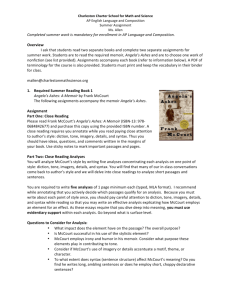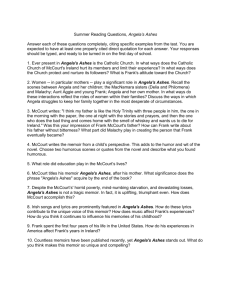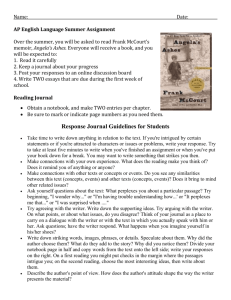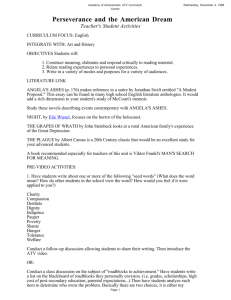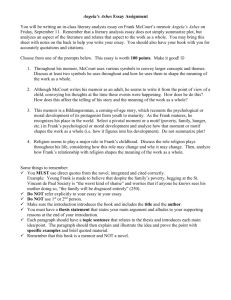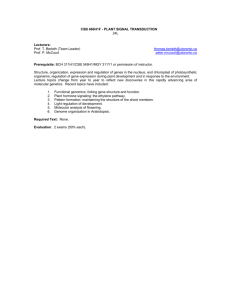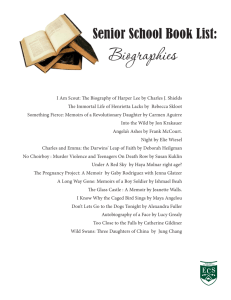GRADE 12: Theme: Synthesis of Form and Content
advertisement
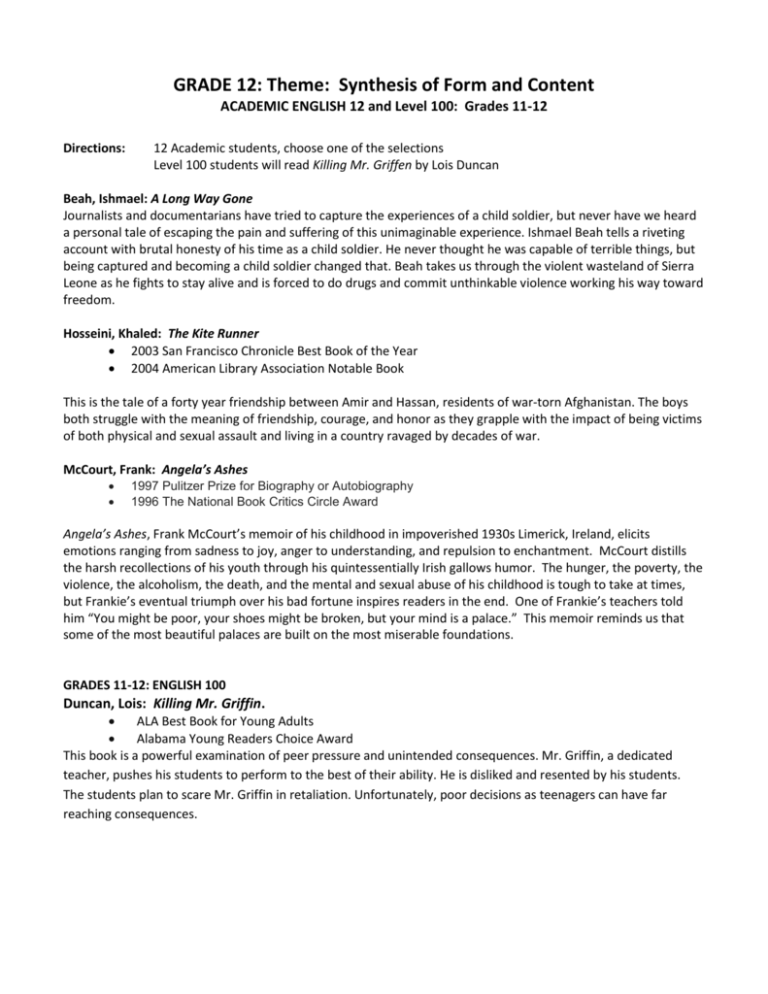
GRADE 12: Theme: Synthesis of Form and Content ACADEMIC ENGLISH 12 and Level 100: Grades 11-12 Directions: 12 Academic students, choose one of the selections Level 100 students will read Killing Mr. Griffen by Lois Duncan Beah, Ishmael: A Long Way Gone Journalists and documentarians have tried to capture the experiences of a child soldier, but never have we heard a personal tale of escaping the pain and suffering of this unimaginable experience. Ishmael Beah tells a riveting account with brutal honesty of his time as a child soldier. He never thought he was capable of terrible things, but being captured and becoming a child soldier changed that. Beah takes us through the violent wasteland of Sierra Leone as he fights to stay alive and is forced to do drugs and commit unthinkable violence working his way toward freedom. Hosseini, Khaled: The Kite Runner 2003 San Francisco Chronicle Best Book of the Year 2004 American Library Association Notable Book This is the tale of a forty year friendship between Amir and Hassan, residents of war-torn Afghanistan. The boys both struggle with the meaning of friendship, courage, and honor as they grapple with the impact of being victims of both physical and sexual assault and living in a country ravaged by decades of war. McCourt, Frank: Angela’s Ashes 1997 Pulitzer Prize for Biography or Autobiography 1996 The National Book Critics Circle Award Angela’s Ashes, Frank McCourt’s memoir of his childhood in impoverished 1930s Limerick, Ireland, elicits emotions ranging from sadness to joy, anger to understanding, and repulsion to enchantment. McCourt distills the harsh recollections of his youth through his quintessentially Irish gallows humor. The hunger, the poverty, the violence, the alcoholism, the death, and the mental and sexual abuse of his childhood is tough to take at times, but Frankie’s eventual triumph over his bad fortune inspires readers in the end. One of Frankie’s teachers told him “You might be poor, your shoes might be broken, but your mind is a palace.” This memoir reminds us that some of the most beautiful palaces are built on the most miserable foundations. GRADES 11-12: ENGLISH 100 Duncan, Lois: Killing Mr. Griffin. ALA Best Book for Young Adults Alabama Young Readers Choice Award This book is a powerful examination of peer pressure and unintended consequences. Mr. Griffin, a dedicated teacher, pushes his students to perform to the best of their ability. He is disliked and resented by his students. The students plan to scare Mr. Griffin in retaliation. Unfortunately, poor decisions as teenagers can have far reaching consequences. GRADE 12: Theme: Synthesis of Form and Content HONORS ENGLISH 12 Directions: Read the required selection. Optional: read one of the recommended options. Required: Hosseini, Khaled: The Kite Runner 2003 San Francisco Chronicle Best Book of the Year 2004 American Library Association Notable Book This is the tale of a forty year friendship between Amir and Hassan, residents of war-torn Afghanistan. The boys both struggle with the meaning of friendship, courage, and honor as they grapple with the impact of being victims of both physical and sexual assault and living in a country ravaged by decades of war. RECOMMENDED SELECTIONS: McCourt, Frank: Angela’s Ashes 1997 Pulitzer Prize for Biography or Autobiography 1996 The National Book Critics Circle Award Angela’s Ashes, Frank McCourt’s memoir of his childhood in impoverished 1930s Limerick, Ireland, elicits emotions ranging from sadness to joy, anger to understanding, and repulsion to enchantment. McCourt distills the harsh recollections of his youth through his quintessentially Irish gallows humor. The hunger, the poverty, the violence, the alcoholism, the death, and the mental and sexual abuse of his childhood is tough to take at times, but Frankie’s eventual triumph over his bad fortune inspires readers in the end. One of Frankie’s teachers told him “You might be poor, your shoes might be broken, but your mind is a palace.” This memoir reminds us that some of the most beautiful palaces are built on the most miserable foundations. Orwell, George: 1984 Winston Smith is being watched. So is every citizen in the fictional province of Oceania. In order to maintain absolute control, Oceania’s totalitarian leader - “Big Brother” - is recording everything they say, think or do. Winston spends his mundane, joyless days working for Oceania’s “Ministry of Truth” revising the news and churning out propaganda to keep citizens grateful for Big Brother’s protection. Eventually, Winston’s growing interest in freedom and real human experience compels him to join a possible rebellion against Big Brother, resulting in consequences that range from sexual liberation to violent torture. More than just a cautionary tale about totalitarian governments and invasion of privacy, George Orwell’s 1984 gets to the core of the inhuman psychology of power. GRADE 12: Theme: Synthesis of Form and Content ADVANCED PLACEMENT LITERATURE AND COMPOSITION Directions: Read all of the selections. Camus, Albert. The Plague 1957 Nobel Prize The post-World War II allegorical tale of a deadly plague that ravishes a north African community. The story chronicles one doctor’s valiant persistence in confronting the disease. Moving depictions of patients in the throes of the plague are contrasted with philosophical meditations on the presence of evil and the efficacy of man. O’Brien, Tim. In The Lake of The Woods. 1994 Editor’s Choice: New York Times Book Review Kathy Wade, wife of a politician, has disappeared. Investigation of this mystery unearths incriminating details about her husband John’s past, including traumatizing experiences from his childhood and his tour of duty during the Vietnam War. The novel goes on to explore the emotionally dysfunctional nature of Kathy and John’s relationship. Saramago, José. Blindness. 1998 Nobel Prize for Literature When a blindness epidemic strikes, desperate citizens of a modern city are reduced to primitive behaviors. Chaos ensues as all semblance of civilization is lost. Descriptions of violence, sexual assault, and promiscuity highlight man’s deterioration. A single person remains immune to the virus and shepherds a group of victims through tumultuous events. This dystopian novel forces the reader to consider the nature of morality and the limitations of government and technology in the modern era.
